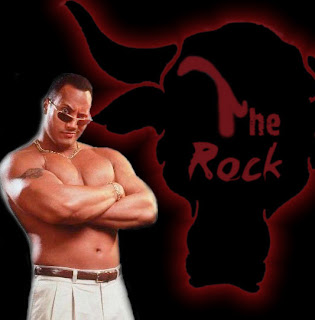 Once upon a time there was a fisherman called Simon. He fell in with a chap called Jesus who nicknamed him The Rock (presumably in preparation for a career in professional wrestling).
Once upon a time there was a fisherman called Simon. He fell in with a chap called Jesus who nicknamed him The Rock (presumably in preparation for a career in professional wrestling).And Jesus answered and said unto him, Blessed art thou, Simon Barjona: for flesh and blood hath not revealed it unto thee, but my Father which is in heaven. And I say also unto thee, That thou art Peter, and upon this rock I will build my church; and the gates of hell shall not prevail against it.
So Simon was - quite technically - petrified. Anyway, this Jesus chap, not content with renaming his friend then decided to walk on water and, in contravention of every health and safety rule I can think of, encouraged Peter to do the same. This did not work out well.
During the fourth watch of the night Jesus went out to them, walking on the lake. When the disciples saw him walking on the lake, they were terrified. "It's a ghost," they said, and cried out in fear. But Jesus immediately said to them: "Take courage! It is I. Don't be afraid." "Lord, if it's you," Peter replied, "tell me to come to you on the water." "Come," he said. Then Peter got down out of the boat, walked on the water and came toward Jesus. But when he saw the wind, he was afraid and, beginning to sink, cried out, "Lord, save me!"
With that story in mind what do you call sea birds that squawk and flutter and gather their plankton prey by dipping their feet in the water like this?
You call it a storm peter. And then you muck about with the letters a bit - a cock is a cockerel - until it's called a storm petrel. (Alternatively you can call them Mother Carey's chickens, but only if you're an extremely salty sailor and even then Mother Carey (a sort of sea goddess) comes from Mater Cara and Mater Cara is the Virgin Mary so it all goes back to Jesus).
 Peter went into French as Pierre. Little Peters are called Pierrots and in Franch sparrows are, for some obscure beret-wearing reason, therefore called perots. For reasons even more obscure but at least blessedly British, we then imported this word as parrot. The word first pops up in the alliterative claptrap that John Skelton called poetry. He wrote an attack on Cardinal Wolsely called Speke, Parrot. Some fragments of the poem survive, which is a pity.
Peter went into French as Pierre. Little Peters are called Pierrots and in Franch sparrows are, for some obscure beret-wearing reason, therefore called perots. For reasons even more obscure but at least blessedly British, we then imported this word as parrot. The word first pops up in the alliterative claptrap that John Skelton called poetry. He wrote an attack on Cardinal Wolsely called Speke, Parrot. Some fragments of the poem survive, which is a pity.Parrot got verbed by Thomas Nashe at the end of the century in the equally pointless but fantastically titled Have With You To Saffron Walden, an inexplicable work of incomprehensible invective.
Parrots are very important linguistically because they preserve the words of the dead. There was an explorer at the beginning of the nineteenth century called Alexander Von Humboldt. He was in Venezuela (of which more some other time) and found an old parrot that still repeated words from the language of the Ature tribe. Nobody else did, because the Atures had been wiped out a few years before.
I don't know if you have ever, in a rage against mortality, called a dead friend's answerphone, but there is something terrible in a people, a culture, a civilisation surviving only in the uncomprehending imitation of a bird.
None of which has anything to do with the Medieval French word péter, meaning to fart. So this post must, obscurely, peter out.
St Peter: The Missing Years












'Have With You To Saffron Walden, an inexplicable work of incomprehensible invective' - this is wonderful! I am a great admirer of invective and spite.
ReplyDeleteThis was an awesome post. I call the answer phones of dead friends, even enemies, all the time, but never really in a "rage against mortality". It's more a whistful type of phonecall, like making absolutely sure they're dead and hoping against hope, that kind of thing.
ReplyDeleteThat's some no holds barred writing from Nashe.